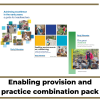Charting a pedagogical course through stormy seas
by Victoria Jefferies Sea state: rough, occasionally very rough, rarely smooth! It’s rarely plain sailing in Early Childhood Education and Care (ECEC) with its myriad
Sustained shared thinking: An episode in which two or more individuals “work together” in an intellectual way to solve a problem, clarify a concept, evaluate activities, extend a narrative etc. Both parties must contribute to the thinking and it must develop and extend.
Siraj-Blatchford et al., REPEY, DfES 2002
“Sustained shared thinking” occurs when two or more individuals “work together” in an intellectual way to solve a problem, clarify a concept, evaluate an activity, extend a narrative etc. Both parties must contribute to the thinking and it must develop and extend the understanding. It was more likely to occur when children were interacting 1:1 with an adult or with a single peer partner and during focussed group work.
The Effective Provision of Pre-School Education (EPPE) Project (2004)
This is a wonderful way of engaging in conversation with children and keeping the conversation flowing through open ended careful questions at the right time.
Use the links below to find out more.
by Victoria Jefferies Sea state: rough, occasionally very rough, rarely smooth! It’s rarely plain sailing in Early Childhood Education and Care (ECEC) with its myriad
The letter below sets out our key asks for the next government.
Early Education Associate, Debi Keyte-Hartland reflects on a recent commission by Balcarras Teaching School Hub In Gloucestershire to deliver a four-day course on Sustained Shared
by Frances Giampapa and Claire Lee Introduction A wealth of evidence demonstrates the fundamental role played by early years (EY) education in shaping a thriving
by Katherine Gulliver Introduction Early Education was recently asked to review the special educational needs and/or disabilities (SEND) provision in the early years within one
Clare Devlin, Early Education Associate What aspects of physical development should we focus on within the Early Years Foundation Stage (EYFS) and other early years
By Debi Keyte-Hartland, Early Education Associate This article is based on one included in the Early Education Journal no 100. To access the full article
In this article, Kate Irvine from Bristol Early Years discusses the impact of practitioners engaging in a sustained process of CPD through cluster groups and
by Dr Jo Albin-Clark, Edge Hill University and Dr Nathan Archer, Leeds Beckett University Inspection in the news Being involved in education in England involves
What are “Fundamental British Values”? by Vicky Hutchin The so-called “Fundamental British Values” form a part of the Prevent Duty, introduced in 2015 and last
The open letter below was sent to Ofsted in November 2023. Download Ofsted’s response We the undersigned are writing to you about the recently published
Early childhood education today has been influenced by key figures such as Froebel, Montessori, Isaacs and MacMillan. Much recent research has supported their ideas although
Early years pedagogy is the theory that informs the practice of teaching children in the early years. The pedagogical research has been carried out by
by Cathy Gunning What is reflective practice? Reading a book by Donald Schon early on in my career as a teacher opened my eyes to
The Early Career Framework has been designed by the Department for Education in England to support newly qualified teachers in England with a structured package of support
The following extracts from past early years teaching newsletters have a feature which supports your team dialogue around pedagogy and practice dilemmas and reflective practice.
Last updated Spring 2018. The preschools of the Reggio Emilia in Northern Italy inspire us with their pedagogy and practice in giving children rich encounters
In most cases, sound early years principles and practices are already in place in settings. The EYPP funding allows settings to review and refine what
Who was Friedrich Froebel (1782-1852) Born on 21 April 1782 Friedrich Froebel was a German educator who invented the kindergarten. He believed that “play is
This article by Early Education Associate Anni McTavish explores the term “cultural capital”, and what it might mean for early years practitioners and their settings.
Welcome to the e-book Child-Centred Competences for Early Childhood Education and Care. The book brings together four years of research undertaken by early childhood academics
Raymond Williams maintained, after years of examining constructs of culture and society that “Culture is one of the two or three most complicated words in








Early Education
2 Victoria Square
St Albans
AL1 3TF
T: 01727 884925
E: office@early-education.org.uk